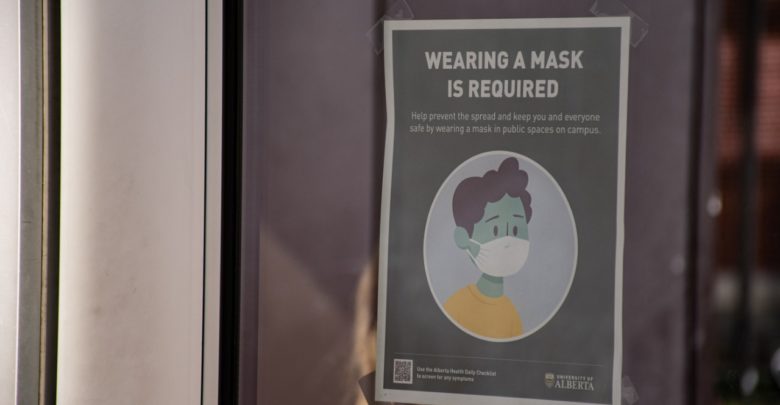 Cody Shimizu
Cody ShimizuOn February 17, University of Alberta President and Vice-Provost Bill Flanagan sent out an email which repealed the Vaccination Directive. At the time, he stated that masks would “continue to be required on campus until the end of the Winter 2022 semester.”
Less than a month later, that changed. Now, masks are “recommended but not required,” with online learning a distant memory and exam season right around the corner. This is not miscommunication — this is dishonesty. Reliable messaging and consistent accommodations are minimum requirements for an inclusive university environment. The university should either commit to its promised mask mandate, or reintroduce off-campus options to formally recognize that the current campus environment is not safe for all students.
At the beginning of the semester, the university was quite accommodating. The Winter 2022 semester started with what was originally intended to be three weeks of online courses, which, in line with changing circumstances, lasted until February 28. To compensate for this, the drop deadline was extended to January 21. This was, on the whole, a good move.
While the extension was only three additional days, they were all weekdays, allowing students enough “hands-on” time with online learning to consider whether it was worth it. If technical difficulties, rising financial pressure, or social isolation posed significant obstacles to a student’s learning, they could simply withdraw and wait until next year.
The university has since neglected to maintain this balance in accommodation.
The addition and removal of online learning raises questions about the consistency of education students can expect, given the sudden reversal of the mask policy.
All undergraduate classes were online for the first two months of the semester. Online learning was either adequate or it was not. If it was adequate, then students — especially the immunocompromised — should be allowed to continue accessing class materials online until the end of the semester.
Students benefit when professors are available for in-person feedback. They benefit from a learning environment that recognizes, not erases, their individual needs. Online delivery negatively impacts concentration, performance, and connection with peers. Administration’s emphasis on in-person learning recognizes that online learning is a compromise, not an ideal. However, students were still charged full price for a compromise, and the conditions that necessitated online options are still present. It makes sense that in-person learning be available for students who can access it safely. It does not make sense that in-person learning is mandatory for those who at risk without any safeguards in place.
We can recognize the quality benefits of in-person learning while understanding the health and safety benefits of online learning — so why aren’t we? Current university policy does not reflect a balance.
If this problem is the result of pressure from the provincial government to fall in line with provincial policy, then Flanagan should never have sent an email saying that masking would continue until the end of the semester. The University of Calgary’s most recent messaging states that they are to continue their mask mandate until the end of the winter term, fulfilling promises made to students even as provincial policy shifts. If the University of Calgary can keep their word under pressure, why can’t the University of Alberta?
It makes sense that public health policy would not be universal — different people require different considerations. However, policy ought to alleviate, not exacerbate, these differences. Students with healthy immune systems are sharing space with those who are immunocompromised. If the university is putting freedom and convenience above all other considerations, it is necessary to provide off-campus options for the health and flexibility of others.
The problem here is twofold. First, the mandate’s repeal is in direct conflict with prior communication. Second, and more importantly, there are options for students who are still at risk on campus — online learning and mask mandates were implemented until a month ago. And yet, both have been snatched away just as quickly as they appeared, with no alternatives to replace them.
It is now well past the drop deadline, so students who were unsure of the repercussions for attending a crammed Tory Basement class with their peers simply had to either lose their money or roll the dice. Uncertainty and inconsistency have been central tenets of the University of Alberta’s pandemic response, and students are left holding the bag.
Ultimately, “recommended but not required” simply means “not required.” Those who would benefit most from mask mandates share space with those who can choose without feeling the full weight of the consequences. Inconsistent university policy translates to exclusion.
It is no longer possible for students to make informed decisions based solely on university communication. Prematurely repealing the mask mandate is both inconsistent and inconsiderate. Either health measures should be required, or off-campus options be re-implemented so that students can reasonably weigh their options without putting their health and finances at stake. Broken promises and withheld accommodations have given students a bad case of whiplash before they’ve even left second gear.




